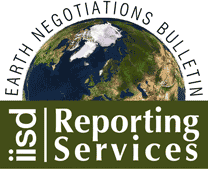Sixth meeting of the Ad Hoc Open-ended Working Group on Access and Benefit-sharing of the Convention on Biological Diversity (ABS 6)
21 - 25 January 2008 | Geneva, Switzerland
|
ABS6 Highlights: Tuesday, 22 January 2008 On Tuesday morning, the Working Group on Access and Benefit-sharing (ABS) met in plenary to continue consideration of the scope of the international regime on ABS and address its nature. A non-paper regarding a structure for the international regime, including text on its objective, was tabled during the lunch break. Following a lengthy discussion on process and a break to allow for regional consultations, a contact group on the objective met in the afternoon and in the evening. A non-paper containing possible elements of a draft decision to be considered by the ninth Conference of the Parties (COP 9) was tabled in the afternoon. |
|||||||||||||||||||||||||||||||||||||||||||||||||||||||||||||||||
Plenary Session
 |
| Left to right: Ahmed Djoghlaf, CBD Executive Secretary; ABS Working Group Co-Chairs Fernando Casas, Colombia, and Timothy Hodges, Canada. |
 |
 |
Afternoon Plenary Session
 |
| After a discussion on how best to proceed, plenary decided to establish a contact group on the objective of the international regime. |
 |
 |
 |
Jimena Nieto, Colombia. |
David Hafashimana, Uganda, speaking for the African Group. |
Fernando Pérez, Chile. |
| An informal consultation of the Like-minded Megadiverse Countries and the African Group. |
Contact Group on the objective
 |
| The contact group was co-chaired by René Lefeber, the Netherlands, (center left) and Pierre du Plessis, Namibia (center right). |
 |
 |
 |
 |
 |
 |
 |
 |
 |
Around the venue
 |
 |
 |
 |
 |
 |
 |
 |
 |
Web coverage:
Monday, 21 Jan - Tuesday, 22 Jan - Wednesday, 23 Jan - Thursday, 24 Jan - Friday, 25 Jan
Related Links
- Convention on Biological Diversity
- ABS 6 website
- ABS 6 documents
- ABS 6 annotated provisional agenda
- ABS 5 documents
- ABS 5 final report
- IISD RS coverage of ABS 5
- IISD RS coverage of ITPGR GB-2
- IISD RS coverage of CBD COP 8
- IISD RS coverage of meetings on biodiversity and wildlife
- Linkages Update
- MEA Bulletin
- African Regional Coverage
Digimarc and the Digimarc logo are registered trademarks of Digimarc Corporation. The "Digimarc Digital Watermarking" Web Button is a trademark of Digimarc Corporation, used with permission.
Please e-mail the Digital Editor should you have any questions regarding the content of this page.
| Back to IISD RS"Linkages" home | Visit IISDnet | Send e-mail to ENB |
© 2007, IISD. All rights reserved.





















